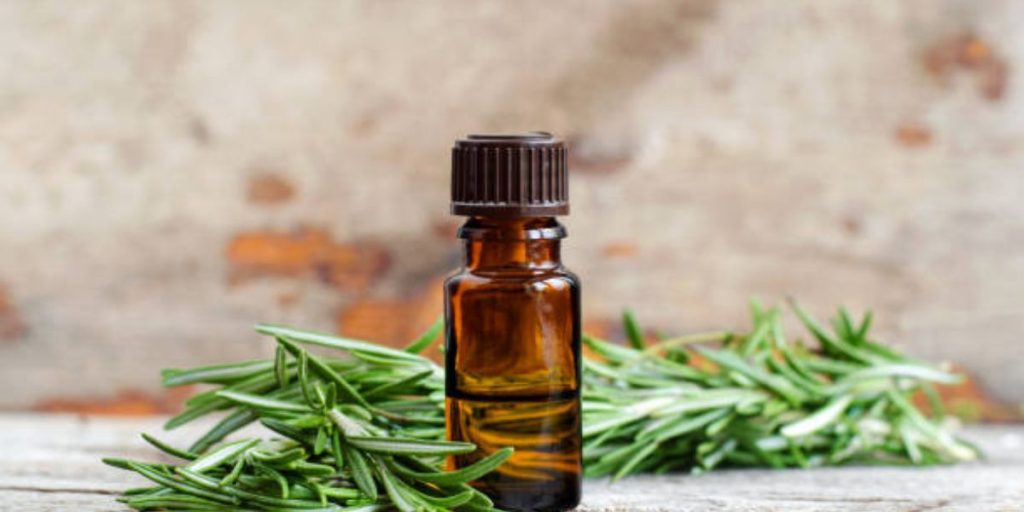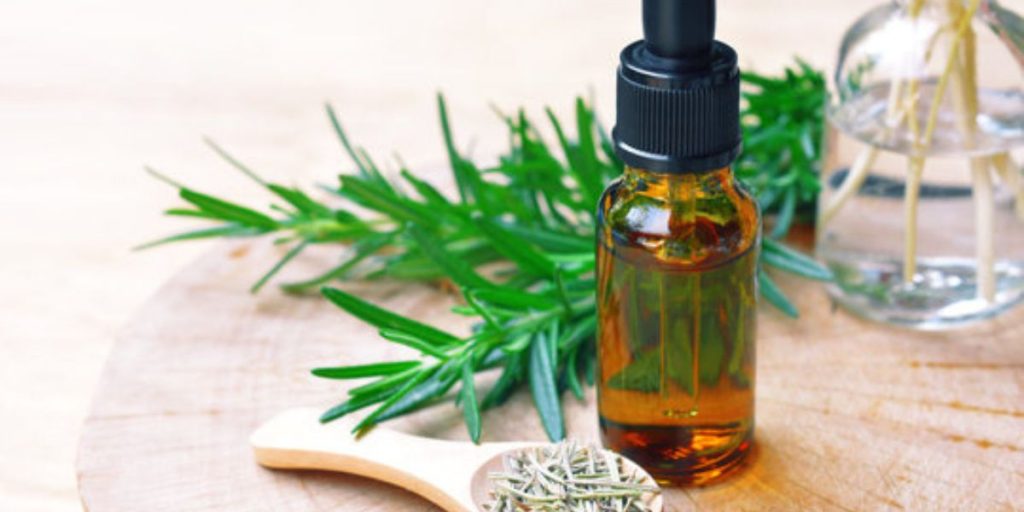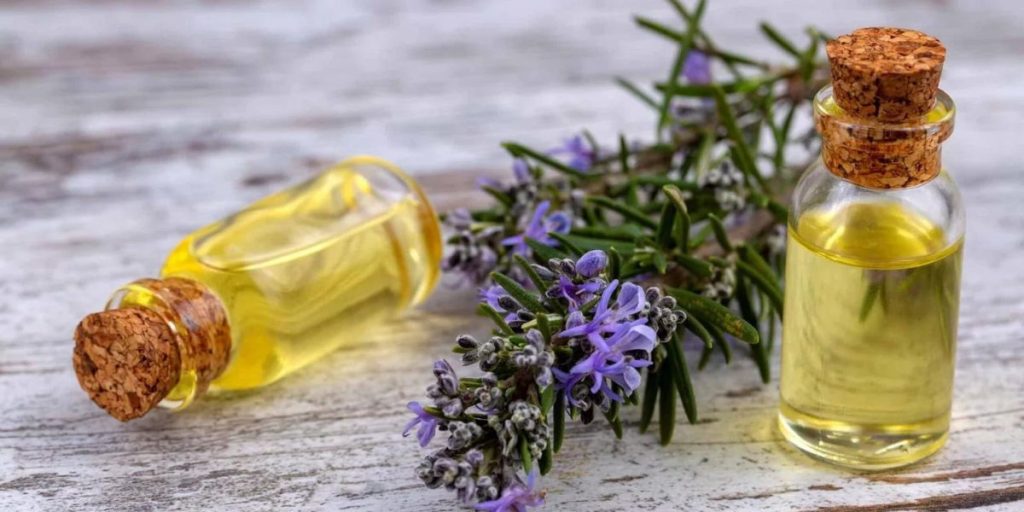Looking for comprehensive approach to learn how to use rosemary oil for hair growth? You are at the right place to learn the details that few know. From the ancient Egyptians to the modern-day beauty enthusiast, rosemary oil has long been revered for its remarkable hair-boosting properties. Its rich history as a potent hair care remedy is deeply rooted in its ability to stimulate hair growth, combat hair loss, and promote overall scalp health.
Rosemary oil, extracted from the flowering herb Rosmarinus officinalis, is a natural treasure trove of hair-nourishing compounds. Its potent blend of antioxidants, anti-inflammatory agents, and hair growth stimulants makes it an effective tool for addressing a range of hair concerns, from thinning hair to slow hair growth.
This comprehensive guide delves into the world of rosemary oil, exploring its efficacy in promoting hair growth and providing practical tips on how to incorporate it into your hair care routine. Whether you’re seeking to revitalize your scalp, strengthen hair follicles, or simply enhance your hair’s overall health, rosemary oil stands ready to unlock your hair’s true growth potential.
Understanding Rosemary Oil and Its Benefits for Hair Growth

Rosemary oil’s remarkable ability to promote hair growth is deeply rooted in its unique blend of bioactive compounds. These compounds work synergistically to stimulate hair follicles, enhance blood circulation to the scalp, and reduce inflammation, creating an optimal environment for healthy hair growth. Hair oils are common but rosemary hair oil has scientific identity because it has been scientifically proven that it can help you regrow your hair.
Stimulating Hair Follicles: A Wake-Up Call for Hair Growth
Rosemary oil has long been praised for its remarkable ability to stimulate hair follicles and promote hair growth. This can be attributed to its active ingredient, carnosic acid. This powerful compound acts as a potent inhibitor of an enzyme called 5-alpha-reductase, which is responsible for converting testosterone into dihydrotestosterone (DHT).
DHT is widely regarded as the culprit behind androgenetic alopecia, commonly known as male pattern baldness. This hormone has the unfortunate tendency to shrink hair follicles, leading to the thinning and eventual loss of hair. However, with the presence of rosemary oil and its inhibitory effect on 5-alpha-reductase, the negative impact of DHT can be mitigated.
By inhibiting 5-alpha-reductase, rosemary oil essentially helps to prevent DHT-induced hair loss. Moreover, it promotes hair follicle growth, giving those dormant follicles the boost they need to thrive and produce healthy strands of hair.
The benefits of rosemary oil go beyond just stimulating hair follicles and preventing hair loss. It is also known for its antimicrobial and anti-inflammatory properties, which can help maintain a healthy scalp environment. A healthy scalp is vital for hair growth, as it provides the ideal environment for hair follicles to flourish.
Additionally, rosemary oil has a soothing and invigorating scent, making it a popular choice in aromatherapy. Its aroma is believed to have a calming effect on the mind and may even help improve concentration and mental clarity.
In conclusion, rosemary oil’s ability to stimulate hair follicles and promote hair growth can be attributed to its active component, carnosic acid. By inhibiting 5-alpha-reductase and preventing the conversion of testosterone into DHT, rosemary oil helps protect hair follicles from damage. Its antimicrobial and anti-inflammatory properties further contribute to maintaining a healthy scalp environment. So, if you’re looking for a natural and effective way to enhance your hair growth, consider incorporating rosemary oil into your hair care routine.
Enhancing Blood Circulation: The Vital Flow for Nourished Hair
Healthy hair growth requires an adequate supply of nutrients and oxygen to the scalp. Rosemary oil, rich in rosmarinic acid, helps improve blood circulation to the scalp by dilating blood vessels. This increased blood flow ensures a steady supply of nutrients and oxygen to hair follicles, promoting hair growth and preventing hair loss due to poor circulation.
Reducing Inflammation: A Soothing Remedy for Hair Follicles
Inflammation of the scalp can hinder hair growth by damaging hair follicles and disrupting the hair growth cycle. Rosemary oil, with its anti-inflammatory properties, helps combat scalp inflammation by reducing the production of inflammatory mediators. This soothing effect creates a favorable environment for hair follicles to thrive and promote healthy hair growth.
Combating Hair Loss and Promoting Hair Regrowth: A Holistic Approach
Rosemary oil’s ability to stimulate hair follicles, improve blood circulation, and reduce inflammation makes it a promising tool for combating hair loss and promoting hair regrowth. Studies have shown that rosemary oil can effectively increase hair density and reduce hair loss in individuals with androgenetic alopecia.
In conclusion, rosemary oil’s efficacy in promoting hair growth stems from its unique combination of bioactive compounds that target the underlying mechanisms of hair growth and hair loss. By stimulating hair follicles, enhancing blood circulation, and reducing inflammation, rosemary oil offers a holistic approach to promoting hair growth and combatting hair loss.
Choosing the Right Rosemary Oil for Hair Growth

Harnessing the hair-boosting benefits of rosemary oil begins with selecting the right product. The quality and purity of rosemary oil significantly impact its effectiveness, making it crucial to choose high-quality, therapeutic-grade rosemary oil.
Therapeutic-Grade Rosemary Oil: The Hallmark of Quality
Therapeutic-grade rosemary oil, also known as essential oil, is the purest and most potent form of rosemary oil available. It undergoes rigorous extraction processes to preserve its therapeutic properties, ensuring maximum efficacy for hair growth.
Selecting Rosemary Oil Brands: Navigating the Market
When selecting rosemary oil brands, it’s essential to consider factors such as reputation, sourcing, and extraction methods. Opt for brands with a proven track record of providing high-quality essential oils and those that source their rosemary from reputable growers.
Identifying Genuine Rosemary Oil: Avoiding Counterfeits
To avoid counterfeit products, look for rosemary oil labeled as “organic” or “wild-crafted.” These designations indicate that the rosemary was grown without pesticides or chemicals and was harvested sustainably. Additionally, check for third-party certifications, such as those from USDA Organic or EcoCert, which verify the oil’s authenticity and quality.
Addressing Rosemary Oil’s Scent: A Matter of Preference
Rosemary oil has a strong, herbaceous scent that may not be everyone’s preference. To mitigate the scent, consider diluting the oil with a carrier oil, such as jojoba oil or coconut oil. A ratio of 1-2 drops of rosemary oil to 1 teaspoon of carrier oil is a good starting point.
Storing Rosemary Oil for Optimal Preservation
To maintain the quality and potency of your rosemary oil, store it in a dark, cool place, preferably in a glass bottle. Avoid direct sunlight, heat, and moisture, as these can degrade the oil’s therapeutic properties.
In conclusion, selecting high-quality, therapeutic-grade rosemary oil is paramount for maximizing its hair growth benefits. By carefully choosing brands, verifying authenticity, and addressing scent preferences, you can harness the power of rosemary oil to promote healthy hair growth.
Incorporating Rosemary Oil into Your Hair Care Routine

Integrating rosemary oil into your hair care routine can effectively promote hair growth and enhance overall scalp health. Here’s a comprehensive guide on incorporating rosemary oil into your hair care regimen, including various methods, application techniques, and frequency considerations:
Method 1: Rosemary Oil Scalp Massage
Ingredients:
- 2-3 drops of rosemary oil
- 1 teaspoon of carrier oil (jojoba, coconut, or olive oil)
Instructions:
- Mix 2-3 drops of rosemary oil with 1 teaspoon of carrier oil in a small bowl or palm of your hand.
- Warm the oil mixture slightly between your palms.
- Apply the oil mixture to your scalp, starting from the hairline and working your way towards the crown.
- Massage the oil gently into your scalp using your fingertips, ensuring even distribution.
- Leave the oil mixture on your scalp for at least 30 minutes, or overnight for deeper conditioning.
- Rinse your hair thoroughly with shampoo and conditioner.
Method 2: Rosemary Oil Hair Mask
Ingredients:
- 2-3 drops of rosemary oil
- 1 tablespoon of your favorite hair conditioner
- Optional: 1 tablespoon of honey (for added moisture)
Instructions:
- In a small bowl, mix 2-3 drops of rosemary oil with 1 tablespoon of your favorite hair conditioner.
- If desired, add 1 tablespoon of honey for extra moisture and nourishment.
- Apply the rosemary oil hair mask evenly to your damp hair, focusing on the scalp and roots.
- Leave the hair mask on for 20-30 minutes, or longer for deeper conditioning.
- Rinse your hair thoroughly with shampoo and conditioner.
Method 3: Rosemary Oil Shampoo
Ingredients:
- 2-3 drops of rosemary oil
- 1-2 tablespoons of your favorite shampoo
Instructions:
- Add 2-3 drops of rosemary oil to your usual shampoo.
- Mix the rosemary oil thoroughly into the shampoo.
- Apply the rosemary oil shampoo to your wet hair, massaging it gently into your scalp.
- Rinse your hair thoroughly with water.
Frequency of Rosemary Oil Use
For optimal hair growth results, incorporate rosemary oil into your hair care routine 2-3 times per week. Consistent use is key to maximizing the oil’s benefits.
Additional Tips for Effective Rosemary Oil Usage
- Warm the oil mixture before applying it to your scalp to enhance penetration.
- Use a wide-tooth comb to distribute the oil evenly throughout your hair.
- After rinsing out the rosemary oil, consider using a leave-in conditioner for added moisture.
- If you experience any scalp irritation or discomfort, discontinue use and consult a dermatologist.
In conclusion, incorporating rosemary oil into your hair care routine offers a natural and effective way to promote hair growth, combat hair loss, and enhance overall scalp health. By following the outlined methods, using high-quality rosemary oil, and maintaining consistent usage, you can unlock the hair growth potential of this remarkable essential oil.
Recipes and DIY Treatments with Rosemary Oil for Hair Growth

Recipe 1: Rosemary Oil and Coconut Oil Hair Mask for Dry Hair
Ingredients:
- 2 tablespoons of coconut oil
- 2-3 drops of rosemary oil
Instructions:
- In a small bowl, combine 2 tablespoons of coconut oil and 2-3 drops of rosemary oil.
- Warm the mixture gently until the coconut oil melts.
- Apply the warm oil mixture evenly to your damp hair, focusing on the ends.
- Leave the hair mask on for 30 minutes to 1 hour.
- Rinse your hair thoroughly with shampoo and conditioner.
Recipe 2: Rosemary Oil and Honey Hair Mask for Damaged Hair
Ingredients:
- 1 tablespoon of honey
- 2 tablespoons of yogurt
- 2-3 drops of rosemary oil
Instructions:
- In a small bowl, combine 1 tablespoon of honey, 2 tablespoons of yogurt, and 2-3 drops of rosemary oil.
- Mix the ingredients well until a smooth paste forms.
- Apply the hair mask evenly to your damp hair, focusing on the damaged areas.
- Leave the hair mask on for 20-30 minutes.
- Rinse your hair thoroughly with shampoo and conditioner.
Recipe 3: Rosemary Oil and Aloe Vera Scalp Treatment for Scalp Inflammation
Ingredients:
- 2 tablespoons of aloe vera gel
- 2-3 drops of rosemary oil
- 1 teaspoon of witch hazel (optional)
Instructions:
- In a small bowl, combine 2 tablespoons of aloe vera gel, 2-3 drops of rosemary oil, and 1 teaspoon of witch hazel (if using).
- Mix the ingredients well until a smooth mixture forms.
- Apply the scalp treatment to your scalp, parting your hair to ensure even distribution.
- Massage the mixture gently into your scalp.
- Leave the treatment on for 15-20 minutes.
- Rinse your scalp thoroughly with water.
Recipe 4: Rosemary Oil and Apple Cider Vinegar Rinse for Oily Hair
Ingredients:
- 1 tablespoon of apple cider vinegar
- 1 cup of water
- 2-3 drops of rosemary oil
Instructions:
- In a spray bottle, combine 1 tablespoon of apple cider vinegar, 1 cup of water, and 2-3 drops of rosemary oil.
- Shake the bottle well to mix the ingredients.
- After shampooing and conditioning your hair, spray the apple cider vinegar rinse evenly onto your scalp and hair.
- Let the rinse air dry or rinse it out with cool water.
Additional Tips

Enhancing hair growth with rosemary oil extends beyond simply applying it to your scalp. A holistic approach that incorporates complementary hair care practices, a healthy lifestyle, and proper safety measures can maximize the oil’s effectiveness and promote overall hair health.
Complementary Hair Care Practices: Synergizing with Rosemary Oil
- Regular Scalp Massages: Scalp massages stimulate blood circulation to the scalp, promoting nutrient delivery and hair growth. Perform scalp massages regularly, even when not using rosemary oil.
- Deep Conditioning: Deep conditioning treatments provide intense nourishment to hair follicles, enhancing hair strength and resilience. Use deep conditioners 1-2 times a week.
- Gentle Hair Care: Avoid harsh hair care practices, such as excessive heat styling and chemical treatments, which can damage hair and hinder growth.
- Protective Styling: Minimize hair breakage and promote hair growth by opting for protective hairstyles like braids, buns, and twists.
- Silk Pillowcase: A silk pillowcase reduces friction against hair, preventing breakage and promoting healthy hair growth.
A Healthy Lifestyle for Hair Wellness
- Nutrition: A balanced diet rich in essential nutrients, including vitamins, minerals, and proteins, supports healthy hair growth. Consume plenty of fruits, vegetables, whole grains, and lean proteins.
- Hydration: Adequate water intake keeps hair hydrated and promotes overall scalp health. Aim to drink 8-10 glasses of water daily.
- Stress Management: Chronic stress can disrupt hair growth cycles. Practice stress-reducing techniques like yoga, meditation, or deep breathing exercises.
- Adequate Sleep: Sufficient sleep allows the body to repair and regenerate, including hair follicles. Aim for 7-8 hours of quality sleep each night.
Safety Precautions for Rosemary Oil Use
- Skin Test: Conduct a patch test on a small area of skin before using rosemary oil to check for potential allergic reactions.
- Dilution: Dilute rosemary oil with a carrier oil to minimize potential skin irritation.
- Avoid Contact with Eyes: Rosemary oil can irritate the eyes. Avoid direct contact and rinse thoroughly with water if it gets into your eyes.
- Pregnancy and Breastfeeding: Consult with a healthcare professional before using rosemary oil if you are pregnant or breastfeeding.
- Internal Use: Rosemary oil is for external use only. Do not ingest rosemary oil.
In conclusion, maximizing the benefits of rosemary oil for hair growth requires a holistic approach that combines rosemary oil treatments with complementary hair care practices, a healthy lifestyle, and proper safety measures. By adopting these strategies, you can create an optimal environment for hair growth and promote healthy, flourishing hair.
Conclusion
Embark on a journey of hair revitalization with rosemary oil, a natural treasure trove of hair-boosting compounds. Its efficacy in stimulating hair follicles, enhancing blood circulation to the scalp, and reducing inflammation has been scientifically validated, making it a promising tool for promoting hair growth and combatting hair loss.
Incorporate rosemary oil into your hair care routine through various methods, including scalp massages, hair masks, and shampoo additives. Tailored recipes for different hair types and specific hair concerns provide personalized solutions for your hair’s unique needs.
Embrace a holistic approach to hair wellness by complementing rosemary oil treatments with healthy hair care practices, a balanced diet, and stress management techniques. Enhance your overall hair health and witness the remarkable hair growth potential of rosemary oil.

Dr. Fazila Abbas stands as a distinguished expert in the realm of skincare and haircare, bringing a wealth of knowledge and experience to her esteemed position as a specialist. With a fervent dedication to the science of dermatology, Dr. Abbas has carved a niche as a trusted advisor in the pursuit of radiant skin and healthy hair.
Her academic journey includes rigorous training in dermatological sciences, where she honed her skills and gained profound insights into the intricacies of skincare and haircare. Dr. Fazila’s holistic approach to beauty emphasizes the integration of medical expertise with personalized care, ensuring that each individual receives tailored solutions for their unique needs. As a respected professional, she continues to contribute to the field through research, innovative treatments, and a commitment to empowering others to look and feel their best. Driven by a passion for transformative skincare and haircare, Dr. Fazila Abbas stands as a beacon of excellence in the world of dermatology.






